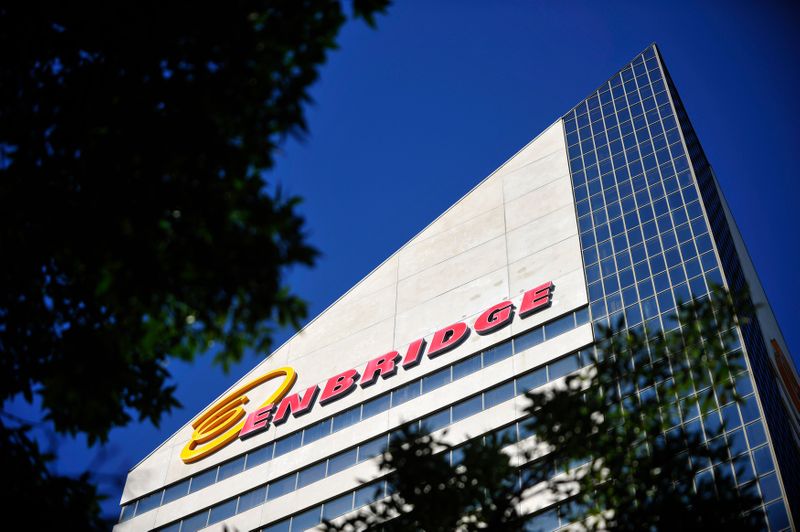
The Enbridge Tower is pictured on Jasper Avenue in Edmonton August 4, 2012. REUTERS/Dan Riedlhuber/File Photo
February 3, 2020
By Rod Nickel
WINNIPEG, Manitoba (Reuters) – Enbridge Inc’s Line 3 pipeline replacement cleared important hurdles on Monday when a Minnesota regulator endorsed a revised environmental impact statement for the project.
The Minnesota Public Utilities Commission’s decision, followed by its approval of a certificate of need and route permit, is a victory for Canadian oil producers, who have been forced to curtail production in Alberta because of a shortage of pipeline capacity.
Enbridge shares jumped 1.5%, hitting their highest level since May 2017.
Line 3, built in the 1960s, carries oil from Alberta to Superior, Wisconsin. It carries less oil than it was designed for because of age and corrosion.
“Instead of a 50-plus year-old pipeline with known integrity issues, a new pipeline would replace it,” Enbridge lawyer Eric Swanson said.
Line 3’s opponents, however, questioned the need for replacing the pipeline amid concerns about fossil fuels.
“If Enbridge is talking about an integrity problem, shut it down,” Joe Plummer, representing the Red Lake Band of Chippewa Indians, told the commission.
Replacing Line 3 would allow Calgary, Alberta-based Enbridge to double capacity to 760,000 barrels per day.
“This (decision) is critically important because when we get that extra shipment capacity we should be able to keep our energy market in balance,” Alberta Premier Jason Kenney said on Twitter.
The Minnesota Department of Commerce revised its environmental impact statement for Line 3 after the Minnesota Court of Appeal ruled last June that the original statement was insufficient regarding a single issue – assessment of a potential spill on Lake Superior and its watershed.
The department opposed issuing a certificate of need, however, saying Enbridge had not provided a forecast for energy demand as required.
A spill would be “catastrophic” to the Leech Lake Band of Ojibwe indigenous community, including its wild rice harvesting, said Benjamin Benoit, the group’s environmental director.
Oil can also spill if it travels by rail, the main alternative to pipelines, said Kevin Pranis, a spokesman for Laborers International Union of North America, which supports the project because of the jobs it would create.
Line 3 still requires various permits and its opponents are expected to formally petition the Minnesota commission to reconsider its decisions. The Sierra Club said in a statement that it would continue to fight Line 3 alongside other groups.
The project is one of three, along with TC Energy Corp’s Keystone XL and the Canadian government-owned Trans Mountain, that have been stalled for years by opposition.
(Reporting by Rod Nickel in Winnipeg, Manitoba; Editing by Dan Grebler, Tom Brown and Grant McCool)

